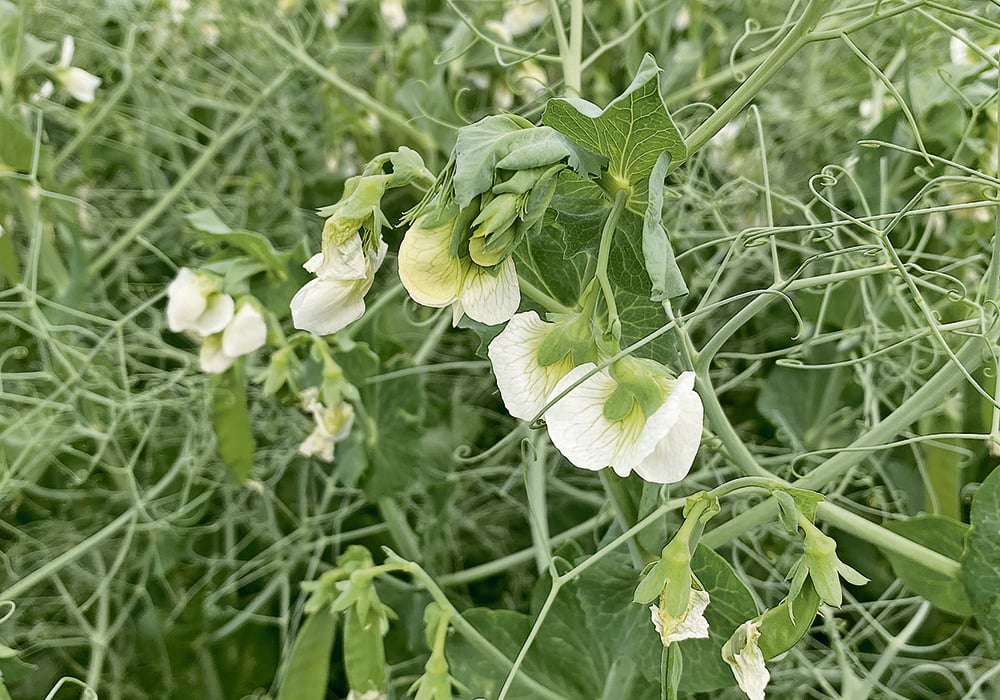The head of the French company building a pea processor near Portage la Prairie says the province holds great potential but Canada’s regulatory regime needs an overhaul
The man tasked with opening the world’s largest pea protein facility says Manitoba “can be the Silicon Valley of plant-based proteins,” but regulatory changes are needed.
Dominic Baumann, chief executive officer of Roquette Canada, made the declaration during a virtual event put on by the Canadian Agri-Food Policy Institute focusing on investment and sustainability in the agri-food system.
In 2017, France-based Roquette announced plans to build the world’s largest pea protein plant in Portage la Prairie, Man.
Baumann said the plant is still in start-up mode, but the company has invested $600 million into the project, hired about 125 employees and has plans to use 125,000 tonnes of peas each year.
Read Also

Farming Smarter receives financial boost from Alberta government for potato research
Farming Smarter near Lethbridge got a boost to its research equipment, thanks to the Alberta government’s increase in funding for research associations.
Roquette picked Canada, according to Baumann, because “it is a safe place to do business” with geographic benefits. Manitoba positions the company in “the middle of Canada” and offers ample supply of hydroelectricity.
Maybe most importantly, the new plant is located close to the raw materials.
“At first we thought only about 30 percent of our peas would come from Manitoba, the rest from Saskatchewan, but actually right now 70 percent of the peas are from Manitoba because farmers see the value we are bringing to the industry,” says Baumann.
But there are challenges.
Baumann holds a long list of grievances with Canada’s regulatory regime. He said the Canadian Food Inspection Agency is slow to approve products already on market elsewhere, like in Europe.
“We are new in this sector, we are developing plant-based proteins, but with these come co-products, and despite having those products marketed elsewhere, CFIA is slow to approve products on market in other countries, like in Europe or the U.S.,” he said.
Last April, CFIA said it would continue to work on broad regulatory reviews and changes.
While those challenges are for the federal government to tackle, Baumann made clear provinces are also responsible for creating part of the regulatory burden.
“Canada is more like a bunch of little countries under one country. All the provinces have very, very different regulations,” he said, noting that products approved in Germany can be sold throughout the European Union, but that isn’t the case in Canada.
Baumann explained constructing the Manitoba plant involved experts, like engineers, from around the country, but provincial regulations over building codes, or requirements for engineers to get special permission to practise in another part of the country, made doing so difficult.
He said smaller companies wanting to invest in the sector may find it too expensive or complicated to do so.
Roquette is also discovering Canada’s carbon pricing scheme “is complicated,” according to Baumann.
“It could create a handicap here for us in Canada, compared to companies in the U.S .where there is no CO2 tax, and frankly our competitors for plant-based proteins, especially pea protein, are in the U.S. and in China,” he said, adding the federal government should have done more proactive consultation with new industries.
Patrick Lemelin, vice-president of agriculture and agri-food for the National Bank of Canada, who also took part in the discussions said carbon pricing is also on his radar.
“We foresee that the carbon exchange will become a commodity very soon,” he said, referencing reports the new administration in the United States may look to expand carbon pricing.
Roquette is one of a handful of companies setting up pea processing plants on the Prairies. In 2017, Proteins Industry Canada was set up to increase the value of crops coveted in high-growth foreign markets.
The federal government says the Protein Industries Supercluster would add more than $4.5 billion to the gross domestic product over 10 years and create more than 4,500 jobs over that same time span.
Overall, the Liberals claim a $918 million investment in five superclusters will create 50,000 jobs and increase GDP by $50 billion over 10 years — a target the Parliamentary Budget Officer has said is unlikely to be met.


















